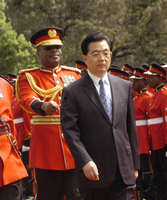For more than half a century, the United States has held the reins of the world's most powerful economic institutions. By design, Washington has long dominated decision-making at both the International Monetary Fund and at the World Bank -- responsible, respectively, for big loans to states and economic development. At the same time, domestic institutions within the U.S., like the Treasury Department, have also exerted significant influence in the economies of foreign lands. The ideology underpinning much of this leverage -- based on free markets and limited government intervention -- was for a long time known formally as the Washington Consensus. In one sense, it all worked. As Fareed Zakaria explains in "The Post-American World," "For sixty years, American politicians and diplomats have traveled around the world pushing countries to open their markets, free up their politics, and embrace trade and technology . . . And it worked: the natives have gotten good at capitalism." In another sense, however, the Washington Consensus backfired. Much of Latin America offers a daunting example. After a "lost decade" of economic stagnation and political instability, many countries in the region have turned to "21st-Century Socialist" leaders like Hugo Ch
Under the Influence: Control with No Strings Attached

